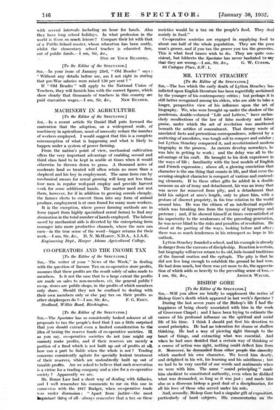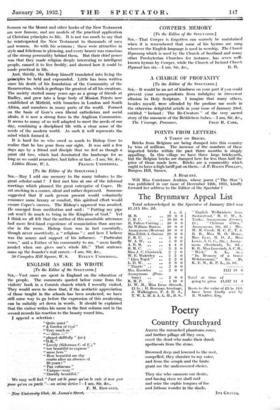BISHOP GORE
[To the Editor of the SPECTATOR.]
Stn,—Will you allow me briefly to supplement the notice of Bishop Gore's death which appeared in last week's Spectator ?
During the last seven years of the Bishop's life I had the happiness of being closely associated with him in the work of Grosvenor Chapel ; and I have been trying to estimate the causes of his profound influence on the spiritual and social life of his time. I think I should put first his devotion to sound principles. lie had no toleration for shams or shallow thinking. He had a way of piercing right through to the heart of things, and extracting what was essential. And when he had once decided that a certain. way of thinking or a course of-action -was right, nothing could deflect him from it. Moreover, he demanded-from other people the-sincerity which marked his own character. We loved him dearly, and delighted in his wit, his learning and his saintliness ; but we had to be very careful of Our words and sentiments when we were with him. The same " sound principling " made him obedient to constituted authority, even when he disliked what was demanded, so long as it was just ; and made him also as a diocesan bishop a good deal of a disciplinarian, for all his love of those who served under his rule.
And secondly, Bishop Gore had a singular gift of ex-position, particularly of hard sUbjeCts; His 'commentaries ea the Sermon on the Mount and other books of the New Testament are now famous, and are models of the practical application of Christian principles to life. It is not too much to say that he reinterpreted the New Testament to thousands of men and women. So with his sermons ; these were attractive in style and felicitous in phrasing, and every hearer was conscious of the strong personality behind them. But their chief power was that they made religion deeply interesting to intelligent people, caused it to live freshly, and showed how it could he made practical in life.
And, thirdly, the Bishop himself translated into living the pxnariples he held and expounded. Little has been written since his death of his foundation of the Community of the Resurrection, which is perhaps the greatest of all his creations. The society started many years ago as a group of friends at Radley, and grew into a large body of Mission Priests now established at Mirfield, with branches in London and South Africa, and members in many parts of the world. Formed on the basis of Gore's own liberal catholicism and social ideals, it is now a strong force in the Anglican Communion. It seems to many of us well adapted to meet the needs of our day, combining a disciplined life with a clear sense of the needs of the modern world. As such it well represents the mind which formed it.
-It is hard for us who owed so much to Bishop Gore to realize that he has gone from our sight. It was said a few days ago by a friend and disciple that we feel as though a great old tree, which had dominated the landscape for as long as we could remember, had fallen at last.—I am, Sir, &c.,





































 Previous page
Previous page